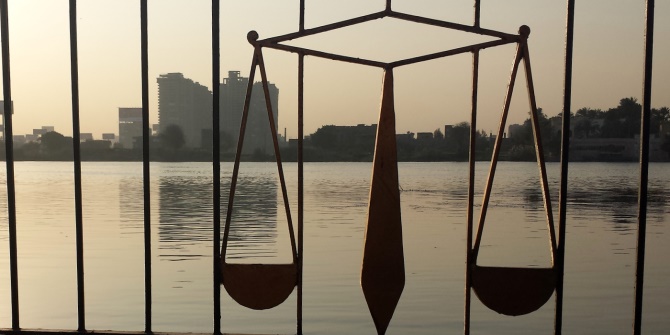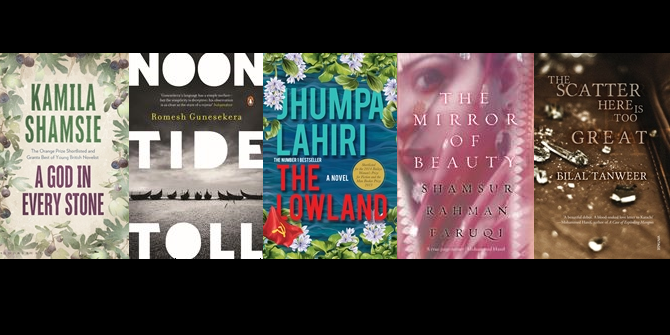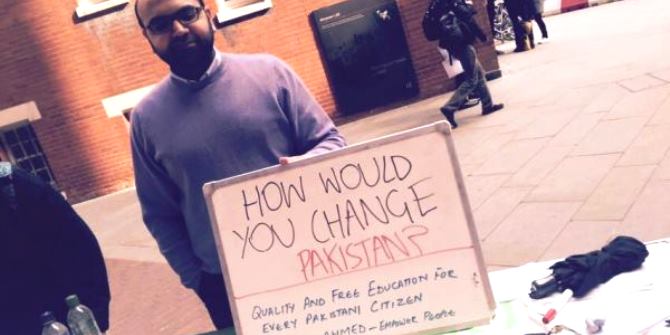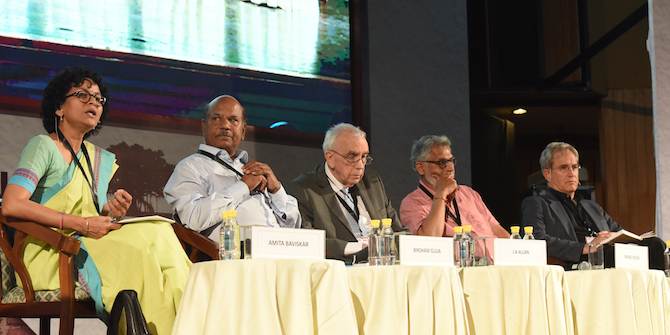On November 7th in association with the LSE South Asia Centre, LSE’s SU Human Rights society and SU South Asia society co-hosted a panel discussion on the Rohingya crisis that has been unfolding in Myanmar. Rebecca Bowers reports.
The strong attendance in LSE’s Saw Swee Hock Centre highlighted the urgency of the humanitarian crisis currently taking place in Myanmar, which was examined in detail by the panel of human rights experts and activists, consisting of Dr. Daniel Aguirre (Former International Legal Advisor for the International Commission of Jurists and Senior Lecturer at Greenwich University), Mark Farmaner (Burma Campaign UK), and Mabrur Ahmed and Rahima Begum of Restless Beings. The discussion was chaired by Tazeen Dhanani (LSE alumna and LSE SU Human Rights Society) and introduced by the academic chair, Dr Nilanjan Sarkar, the Deputy Executive Director of the South Asia Centre at LSE.
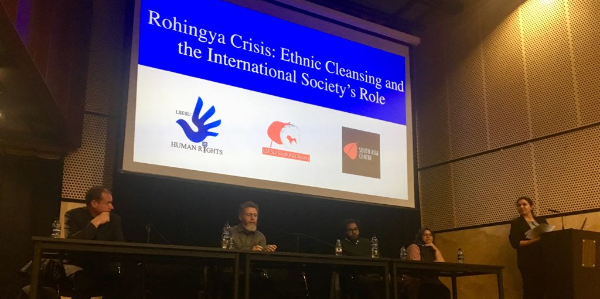
The panel convenes: (L-R) Mark Farmaner, Daniel Aguirre, Mabrur Ahmed, Rahima Begum and Chair Tazeen Dhanani. Photo credit: Rebecca Bowers
Rohingya: a history of persecution
The first speaker, Dr Daniel Aguirre, attributed the lack of international intervention to the desire to ‘maintain a narrative that Myanmar was open for business’, whereby ‘the new idea was that there would be engagement’. However, he continued ‘The problem is engagement easily turns to investment and trade and looking the other way’. As Dr Aguirre and all following panellists highlighted, the history of Rohingya persecution is not new: ‘we have had an almost permanent refugee crisis for 30 years’ stated Aguirre. The refugee crisis dates back to the 1970s although recently this has accelerated with an estimated 600,000 refugees fleeing to Bangladesh since August 25th. Although the panellists acknowledged the colonial legacy of British occupation and their divisive tactics in World War II (which saw the Rohingya side with the British with the promise of an independent state and the Burmese with the Japanese forces), all expressed a wariness of focusing on this as a catalyst of the current crisis, advising that it was more productive to focus on what the British government are now doing to ease the crisis. Furthermore, it was also revealed that many experts including several of the panellists themselves, had been attempting to bring international attention to the treatment of the Rohingya for years, but in the case of Dr Aguirre and his colleagues, ‘we were consistently being told to stop being so gloomy’.
The international response today
Today there remains a continuity in the international community’s detached engagement towards the persecution of the Rohingya. According to Mark Farmaner, we are presently witnessing an effective international sanctioning of the Rohingya crisis, as military figures including Senior General Min Aung Hlaing, are pictured enjoying visits across the world as violence against the Rohingya continued to escalate. This was echoed by Dr Aguirre, who described how Myanmar has ‘been allowed to develop laws that openly discriminate against Rohingya and other minorities and no one has called them up on it’. Although the Myanmar military has since been sanctioned from visiting Europe, the panellists viewed this as an insufficient response, with Farmaner claiming that the Rohingya have become ‘expendable for the greater good of the country’. Farmaner also dismissed the idea that Aung Sang Suu Kyi would have lost the election if she had stood up in favour of the Rohingya, adding that such was her popularity ‘If she had spoken out then it would have made all of the difference. She could have lost 20% of the vote and still won an 80% victory’. Farmaner, who had once been a vocal supporter of Aung San Suu Kyi and campaigned throughout her house arrest, also expressed his disappointment from a recent conversation in which Suu Kyi ‘wasn’t at all sympathetic and didn’t see the Rohingya as belonging in the country’. Describing the surprise of the global community and colleagues that had worked in Myanmar for decades, Farmaner concluded ‘What we couldn’t believe was that Aung San Suu Kyi didn’t believe in democracy and human rights for everybody in this country’.
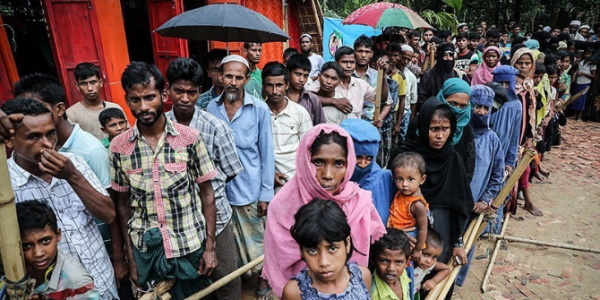
Rohingya refugees. Photo credit: Mahmood Hosseini CC BY 4.0
The unfolding of a genocide?
Mabrur Ahmed, the final panellist to speak, was even more damning of the international community’s response, dismissing the description of the Rohingya situation as a ‘crisis’, he instead called for recognition of the events taking place as genocide. Going on to list each of the points in the UN’s definition of genocide and then providing examples for each taken from his and Begum’s experiences visiting and reporting in the region, Ahmed asked ‘Why are we still talking about ethnic cleansing? Why are we not more aggressive and more accurate in our language to call it a genocide?’ One of the reasons, he stated, was that whilst all UN member nations (in a near unprecedented episode of agreement) including Russia and China had supported the security council in condemning the violence against and displacement of the Rohingya, an official definition of genocide would legally require action and foreign intervention – something which the international community is still largely unwilling to provide. Given the foreign interests that lie in Myanmar and Rakhine state (which provides access to the Bay of Bengal for China, for instance), and the enduring legacies of recent Western intervention in areas such as Afghanistan and Iraq, there is a reluctance to escalate the present crisis beyond ‘ethnic cleansing’ into that of genocide, although the term is now being used more frequently by news agencies and activists.
Actions for the international community and civil society
Despite Farmaner describing the present status in Myanmar as ‘the [..] worst human rights crisis Burma is facing in decades and the weakest international response in decades’, he also warned the audience against the understandable pessimism surrounding the Rohingya crisis, stating ‘we shouldn’t lose hope that the international community can’t do anything. Combined with the efforts of students not all hope is lost’. One further option briefly explored by panellists would be to cease trade activities and therefore economically challenge the ‘Generals and their cronies [as] the legitimate owners of business where sanctions have been lifted’ according to Dr Aguirre.
Ahmed echoed Farmaner’s earlier sentiment regarding students – encouraging the audience to engage with the democratic processes available to them, urging the audience to send petitions; write to their MPs; request visits from MPs to LSE to speak on the issue; and to exercise their right to protest. The panellists also raised the lacklustre response of the international community to allocating funding, which has fallen short of the $400 million UN appeal thus far. As Dr Aguirre stated: ‘it is not for Bangladesh to house and sustain a million people alone’. However, the issue at hand is increasing in urgency as Ahmed warned in his closing remarks: ‘There is no time left. Six hundred thousand people have already left. If this is not the final push [by the Myanmar military and authorities] then in twelve months there will be’.
The discussion was live streamed and can be viewed here
This article gives the views of the author, and not the position of the South Asia @ LSE blog, nor of the London School of Economics. Please read our comments policy before posting.
About the Author
 Rebecca Bowers is a blog editor at the South Asia Centre and final year PhD student in the Anthropology Department at the London School of Economics. Rebecca’s research explores the lives of female construction workers and their families in Bengaluru, India.
Rebecca Bowers is a blog editor at the South Asia Centre and final year PhD student in the Anthropology Department at the London School of Economics. Rebecca’s research explores the lives of female construction workers and their families in Bengaluru, India.



